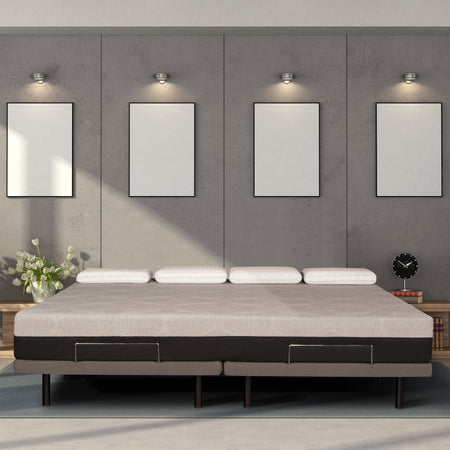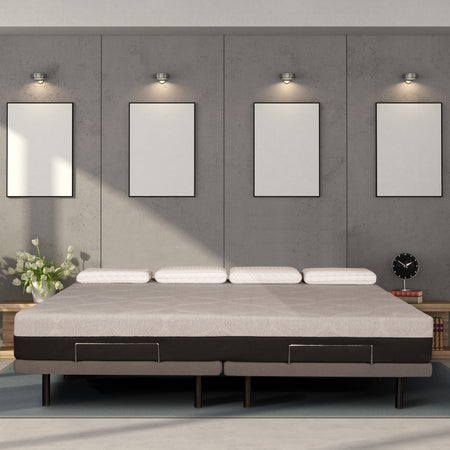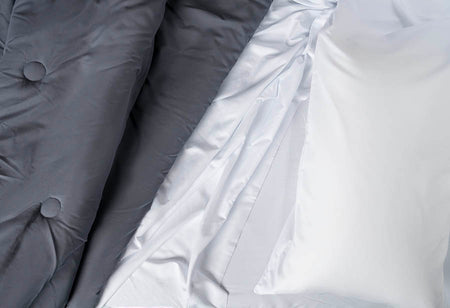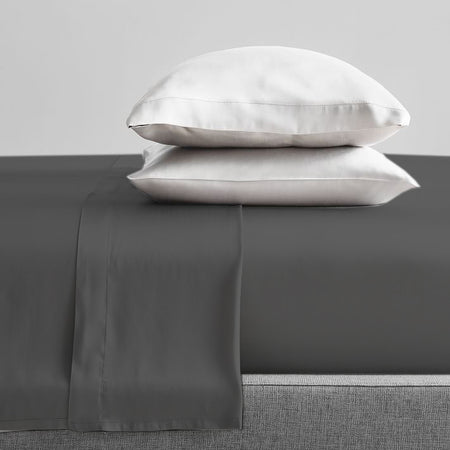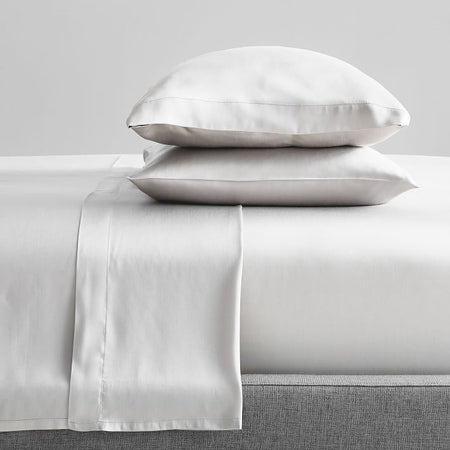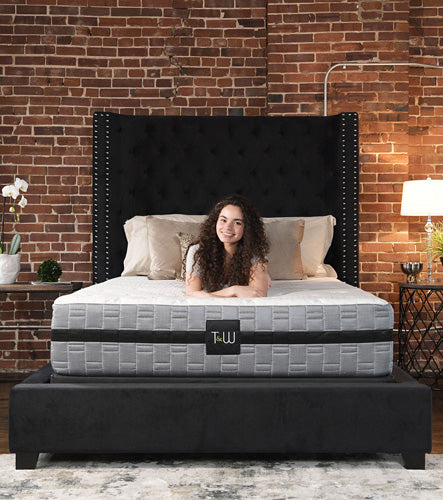Your bedtime environment can influence the way you fall and stay asleep. Many studies have shown people sleep better when their bedroom is optimized for temperature, comfort, light, and noise levels. And seeing how critical sleep is in maintaining overall well-being, it's essential to pay attention to the details of your sleep environment. In this article, we will explore the key factors that contribute to creating the perfect bedtime environment and provide practical tips on bedroom adjustments that will ensure you get optimal sleep.
Understanding Sleep Science

Sleep is not just a passive, uniform state; it's a complex process composed of multiple cycles and stages that are orchestrated by our internal biological clock, known as the circadian rhythm. These phases are divided into two main categories: Rapid Eye Movement (REM) sleep and Non-Rapid Eye Movement (NREM) sleep.
NREM Sleep comprises the majority of your sleep time and is divided into three distinct phases.
- NREM Stage 1 is the transitional phase between wakefulness and sleep
- NREM Stage 2 is characterized by light sleep,
- NREM Stage 3, also known as slow-wave sleep, is the deepest and most restorative phase
REM sleep is where vivid dreaming occurs, and it's often associated with cognitive processes and memory consolidation. During this phase, your brain is highly active, and your body is mostly immobilized to prevent you from acting out your dreams.
These sleep cycles repeat multiple times during the night, with each cycle lasting around 90 minutes. Understanding these cycles is essential because it helps you appreciate the importance of uninterrupted sleep and the need to create an environment that supports these natural rhythms.
Circadian Rhythm and Light Exposure
Your circadian rhythm is like an internal clock that regulates your sleep-wake cycle over a 24-hour period. It's largely influenced by external factors, with the most potent being light exposure. Natural light during the day helps synchronize your internal clock, while exposure to artificial or blue light at night can disrupt it.
With that said, here’s how to create the perfect bedtime environment
Choose the Right Mattress and Bedding

An old mattress or one that doesn’t align with your body’s needs can do more than just interfere with your sleep. It can cause allergies, chronic pain, weight gain, and even poor mental health. Replace your old mattress with one that suits your comfort preferences.
You can check out different mattress options at the Bedding Mart. We offer a wide range of mattress options from reputable brands like Taylor & Wells, Tempur-Pedic, Serta and Beautyrest to match the varying needs of our customers. When deciding your bedding choice, consider your firmness preference, sleeping position (back, side, or stomach) and any specific health concerns you may have, such as back pain or allergies.
Beyond your mattress, you want to invest in high-quality sheets, pillowcases, and blankets that feel comfortable against your skin. Cotton, linen and micro-fiber sheets are popular choices for their softness, breathability and maintenance ease. And don’t forget about pillows. Choose pillows that support your neck and head in a comfortable position, aligning your spine properly.
At the Bedding Mart, we carry a large selection of breathable, hypoallergenic pillows that feature dynamic cooling technology for extra comfort. Our Sliver Smart Pillow also boasts spinal support for those who need it.
Your bed is the centerpiece of your bedroom. It has the ability to make or break the bedroom ambiance and overall comfort. If you’re thinking about sleep quality enhancement, then finding the right mattress and bedding should be a top priority.
Maintain an Optimal Bedroom Temperature
There’s a whole science behind the effects of room temperature on our sleep quantity, quality, and habits. So, in your quest to create the perfect bedtime environment, you should prioritize finding the optimum temperature for your sleeping needs. Experts recommend 65 degrees Fahrenheit (18 degrees Celsius), but anything in the range of 60-68 degrees Fahrenheit (15-19 degrees Celsius) will work just fine.
You can also work with high-quality sheets that are soft and breathable, and pair them with blankets and duvets that can be easily adjusted to provide more or less warmth as needed. Layering your bedding allows you to regulate your body temperature throughout the night.
Manage Light Levels
Light – whether natural or artificial – regulates the body’s internal clock that signals when to wake up and sleep. It also influences the production of melatonin, a hormone that helps your sleep. Exposure to light can disrupt sleep cycles and lead to more fragmented sleep.
Preliminary evidence shows that closing your eyes is not enough; your eyelids cannot block all the light. The impacts on circadian rhythm can still happen even with closed eyes and low levels of indoor light.
As a general rule, you should use ambient lighting in your bedroom, especially in the evening, to signal to your body that it's time to wind down. A great way to do this is by installing blackout curtains in your bedroom to block out external sources of light, such as streetlights or car headlights.
You can also reduce exposure to artificial light sources, such as smartphones, tablets, and computers, at least an hour before bedtime. The blue light emitted by these devices can disrupt your circadian rhythm and make it harder to fall asleep.
Control Noise Levels
Sounds like music or road traffic may be trivial during the day, but they can become bothersome at night, especially when they are sudden. Even sounds that don’t wake you can still arouse you slightly and change the time you spend in certain sleep stages.
So, if you live in a noisy area, consider soundproofing your bedroom, whether through weatherstripping your windows and doors or using soundproof curtains. You can also use white noise machines or apps to drown out disruptive sounds and create a consistent background noise that's soothing for sleep. If noise remains a problem, use earplugs designed for sleeping to block out unwanted sounds.
Keep Your Bedroom Clutter-Free

According to sleep experts, a messy and cluttered bedroom will affect how fast you fall and stay asleep. That’s mostly due to the fact that clutter contributes to stress and makes it harder to relax. The brain constantly makes associations between your environment and behavior. A messy bedroom stimulates your brain and makes it associate it with stress. This makes it hard to fall asleep in that space.
As you strive to create an ideal sleep environment, sort out items and keep, donate, or discard accordingly. Limit the number of electronic devices in your bedroom, as they can be both visually and mentally stimulating. If possible, reserve your bedroom primarily for sleep and intimate activities. You might also want to invest in storage solutions like baskets, shelves, and bins to keep your belongings organized and out of sight.
Don’t Forget about Air Quality
Air quality is an important yet often overlooked aspect of creating the perfect bedtime environment for quality sleep. Poor air quality can lead to discomfort, allergies, and even sleep disturbances. If your room’s air isn’t as fresh as it should be, you should open windows regularly and use a fan or air purifier to circulate and filter air.
Houseplants are a common addition to your room that can help freshen the air. You may also need to wash your sheets, pillowcases, and blankets regularly to prevent dust and allergen build-up. If the problem persists, it might be time to consider replacing your bedding with hypoallergenic options.
When it comes to creating the perfect bedtime environment for a restful night's sleep, every detail matters. From the right mattress and bedding to bedtime routine to managing light, sound, and air quality, optimizing your sleep space can significantly impact the quality of your sleep and overall well-being.
If you're in search of essential sleep products, look no further than the Bedding Mart. We offer a wide selection of mattresses, pillowcases, sheets, and more, making it easier for you to find the perfect bedding items that suit your comfort preferences and needs.


